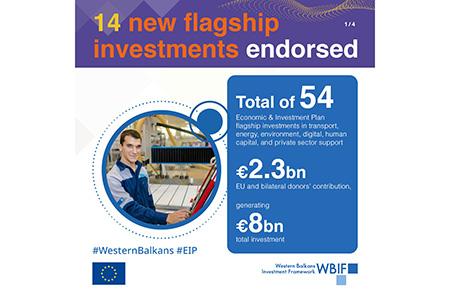European Commission launched an additional €2.1 billion investment package for the Western Balkans under the Economic and Investment Plan

Today, the European Commission has launched a new financial package to support 14 investment flagships in transport, energy, environment, human capital, and private sector support in the Western Balkans, worth, in total €2.1 billion. This is the fifth investment package under the EU’s Economic and Investment Plan for the Western Balkans. Projects have been prepared in close cooperation with the Western Balkans partners and the international financial institutions to accelerate the European perspective of the region.
EU Commissioner for Neighbourhood and Enlargement, Olivér Várhelyi, said: “With this new investment package we are sending a loud and clear message to our Western Balkans partners: their future is within the EU and we are making steady progress to close the economic development divide. These projects will better connect the region from within and with the EU, help decarbonise their economies, and support the competitiveness of the private sector in the region. Now, I call on our Western Balkans partners and international financial institutions to rollout these projects as soon as possible so citizens and businesses in the region can reap the benefits from these investments.”
The €2.1 billion investment package, which includes €528 million in EU grants from the Instrument for Pre-accession Assistance (IPA III), additional bilateral contributions from EU Member States and Norway, loans from international financing institutions, and contributions from the economies of the Western Balkans, has been endorsed today by the Operational Board of the Western Balkans Investment Framework (WBIF).
The 14 new projects approved cover the following priority sectors:
- Sustainable transport: construction of motorway sections and subsections in Road Corridor Vc in Bosnia and Herzegovina and Corridor VIII in North Macedonia. These projects will facilitate regional trade, reduce travel times, and spur sustainable economic growth.
- Clean energy: rehabilitation of hydropower plants in Serbia and Bosnia and Herzegovina to reduce greenhouse gas emissions and enhance energy efficiency in North Macedonia. Other projects include strengthening North Macedonia’s transmission network or deploying green transport in Tirana.
- Environment & climate: rehabilitation of Sarajevo water system to enhance public health, boost commercial infrastructure, and improve the overall efficiency of water supply in the Sarajevo canton.
- Human development: improvement of energy efficiency and integrated energy management of the University of Belgrade.
- Private sector: supply of financing for renewable and efficient energy measures in the region, sustainable access to finance for entrepreneurship, and a combination of specialised financing for digitalisation and competitiveness for micro and small businesses (MSMEs). These projects will help reduce inequality, increase job creation, and reduce energy consumption and greenhouse gas emissions.
Background
The EU’s Economic and Investment Plan for the Western Balkans, of up to €30 billion in investments, including up to €9 billion of EU grant funding, aims to spur the long-term recovery, accelerate a green and digital transition, as well as foster regional cooperation and convergence with the EU.
Following the new investment package, in total, 54 EIP flagship investments are being supported through the WBIF, worth €8 billion approximately, including €2.3 billion in EU grants.
The Western Balkans Investment Framework (WBIF) is a joint financial platform of the European Commission, financial organisations, EU Member States, and Norway aimed at enhancing cooperation in public and private sectors investments for the region’s socio-economic development and contributing to the European integration of the Western Balkans. The WBIF is the main financial vehicle for implementing the EU’s ambitious Economic and Investment Plan for the Western Balkans.






